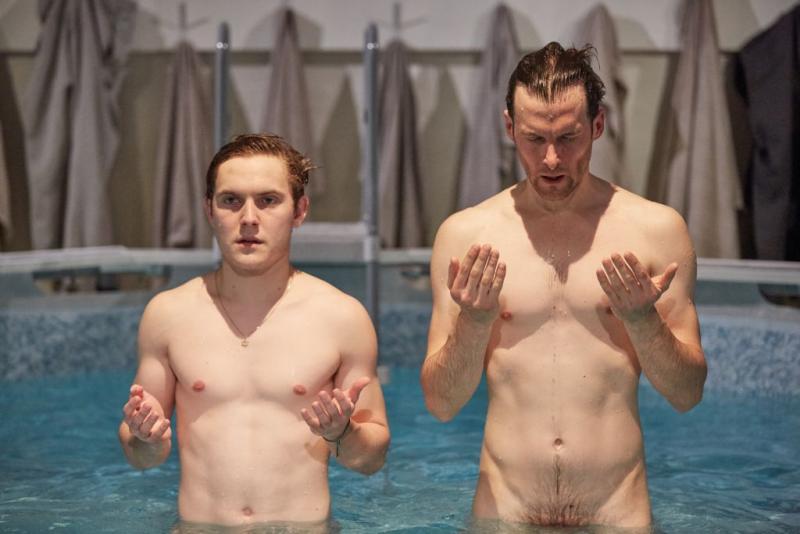The Mikvah Project, The Yard, Hackney | reviews, news & interviews
The Mikvah Project, The Yard, Hackney
The Mikvah Project, The Yard, Hackney
New play about Jewish faith and the limits of love makes a splash

In the beginning was the Word and, not long after, came a need for ritual purification. “When Adam was banished from Eden, he sat in the river that flowed from the garden. Adam immersed in the water, in the very first Mikvah …”.
Goyim audience members will be grateful, as I was, for the gloss on this traditional Jewish practice given by one of the characters in the opening minutes of The Mikvah Project, the first full-length play by Josh Azouz, who is currently on the Royal Court’s writers programme. We were more grateful still for his bringing the ballast of comedy to such topics as faith, transgression and unsanctioned love. Without the laughter that ripples though this piece, its weighty cargo might well have sunk.
 Avi, 35, and Eitan, 17, cross paths every Friday night at a north London Mikvah, startlingly realised on stage with a full-sized, water-filled pool (design, Cécile Trémolières). The pair have little in common beyond synagogue and a love of football. In fact the older, married man (played with glittering intensity by Jonah Russell, fresh from the Young Vic’s A View from the Bridge) at first finds the callow Eitan (a rubberball Oliver Coopersmith) irritating at almost every level. “Why do Jewish boys from Finchley insist on talking as if they come from Jamaica?” he snipes. Eitan, for his part, is half sceptical, half in awe of Avi’s religious zeal. Why, he asks, does he immerse himself nine times when tradition demands only three? The answer: so that his sperm “can become better swimmers”. Avi is still childless after eight years of marriage, and his relationship is feeling the strain.
Avi, 35, and Eitan, 17, cross paths every Friday night at a north London Mikvah, startlingly realised on stage with a full-sized, water-filled pool (design, Cécile Trémolières). The pair have little in common beyond synagogue and a love of football. In fact the older, married man (played with glittering intensity by Jonah Russell, fresh from the Young Vic’s A View from the Bridge) at first finds the callow Eitan (a rubberball Oliver Coopersmith) irritating at almost every level. “Why do Jewish boys from Finchley insist on talking as if they come from Jamaica?” he snipes. Eitan, for his part, is half sceptical, half in awe of Avi’s religious zeal. Why, he asks, does he immerse himself nine times when tradition demands only three? The answer: so that his sperm “can become better swimmers”. Avi is still childless after eight years of marriage, and his relationship is feeling the strain.
Jay Miller’s direction, another sure-handed debut, makes light work of the many rapid third-person monologues, delivered at microphone stands, and live incidental music, begun as a hummed line of melody and embellished, sometimes to glorious choral effect, by electronic looping. The men’s nakedness feels unforced, too. In fact it’s a measure of the characters’ credibility that it would have been embarrassing if the actors hadn’t stripped off for immersion.
Little by little, we learn things about Eitan and Avi that modify our initial assessment, not just of them and their relation to each other, but also of secondary characters who don’t appear. And, given the claustrophobic setting (the characters can only be in the pool, or out of it), the writer succeeds in creating some impressive mood changes and narrative swerves. Suffice to say that Eitan and Avi’s story is not predictable at any point.
I loved this play, for its frankness, its honest physicality, its two superlative, under-the-skin performances, and its sense of fun. To judge by his online profile, the playwright has devoted many of his earlier theatrical efforts to intercultural understanding, particularly between Jews and Muslims. If we truly wish to respect faith through knowledge and insight, The Mikvah Project is a good place to start.
Add comment
The future of Arts Journalism
You can stop theartsdesk.com closing!
We urgently need financing to survive. Our fundraising drive has thus far raised £49,000 but we need to reach £100,000 or we will be forced to close. Please contribute here: https://gofund.me/c3f6033d
And if you can forward this information to anyone who might assist, we’d be grateful.

Subscribe to theartsdesk.com
Thank you for continuing to read our work on theartsdesk.com. For unlimited access to every article in its entirety, including our archive of more than 15,000 pieces, we're asking for £5 per month or £40 per year. We feel it's a very good deal, and hope you do too.
To take a subscription now simply click here.
And if you're looking for that extra gift for a friend or family member, why not treat them to a theartsdesk.com gift subscription?
more Theatre
 Little Brother, Soho Theatre review - light, bright but emotionally true
This Verity Bargate Award-winning dramedy is entertaining as well as thought provoking
Little Brother, Soho Theatre review - light, bright but emotionally true
This Verity Bargate Award-winning dramedy is entertaining as well as thought provoking
 The Unbelievers, Royal Court Theatre - grimly compelling, powerfully performed
Nick Payne's new play is amongst his best
The Unbelievers, Royal Court Theatre - grimly compelling, powerfully performed
Nick Payne's new play is amongst his best
 The Maids, Donmar Warehouse review - vibrant cast lost in a spectacular-looking fever dream
Kip Williams revises Genet, with little gained in the update except eye-popping visuals
The Maids, Donmar Warehouse review - vibrant cast lost in a spectacular-looking fever dream
Kip Williams revises Genet, with little gained in the update except eye-popping visuals
 Ragdoll, Jermyn Street Theatre review - compelling and emotionally truthful
Katherine Moar returns with a Patty Hearst-inspired follow up to her debut hit 'Farm Hall'
Ragdoll, Jermyn Street Theatre review - compelling and emotionally truthful
Katherine Moar returns with a Patty Hearst-inspired follow up to her debut hit 'Farm Hall'
 Troilus and Cressida, Globe Theatre review - a 'problem play' with added problems
Raucous and carnivalesque, but also ugly and incomprehensible
Troilus and Cressida, Globe Theatre review - a 'problem play' with added problems
Raucous and carnivalesque, but also ugly and incomprehensible
 Clarkston, Trafalgar Theatre review - two lads on a road to nowhere
Netflix star, Joe Locke, is the selling point of a production that needs one
Clarkston, Trafalgar Theatre review - two lads on a road to nowhere
Netflix star, Joe Locke, is the selling point of a production that needs one
 Ghost Stories, Peacock Theatre review - spirited staging but short on scares
Impressive spectacle saves an ageing show in an unsuitable venue
Ghost Stories, Peacock Theatre review - spirited staging but short on scares
Impressive spectacle saves an ageing show in an unsuitable venue
 Hamlet, National Theatre review - turning tragedy to comedy is no joke
Hiran Abeyeskera’s childlike prince falls flat in a mixed production
Hamlet, National Theatre review - turning tragedy to comedy is no joke
Hiran Abeyeskera’s childlike prince falls flat in a mixed production
 Rohtko, Barbican review - postmodern meditation on fake and authentic art is less than the sum of its parts
Łukasz Twarkowski's production dazzles without illuminating
Rohtko, Barbican review - postmodern meditation on fake and authentic art is less than the sum of its parts
Łukasz Twarkowski's production dazzles without illuminating
 Lee, Park Theatre review - Lee Krasner looks back on her life as an artist
Informative and interesting, the play's format limits its potential
Lee, Park Theatre review - Lee Krasner looks back on her life as an artist
Informative and interesting, the play's format limits its potential
 Measure for Measure, RSC, Stratford review - 'problem play' has no problem with relevance
Shakespeare, in this adaptation, is at his most perceptive
Measure for Measure, RSC, Stratford review - 'problem play' has no problem with relevance
Shakespeare, in this adaptation, is at his most perceptive
 The Importance of Being Earnest, Noël Coward Theatre review - dazzling and delightful queer fest
West End transfer of National Theatre hit stars Stephen Fry and Olly Alexander
The Importance of Being Earnest, Noël Coward Theatre review - dazzling and delightful queer fest
West End transfer of National Theatre hit stars Stephen Fry and Olly Alexander

Comments
This Jewish American is
In depends on the specific
Having not seen this play,
Having not seen this play, and extrapolating from the review – it would seem the two male characters are gay, or at least attracted to each other. Yes, the mikveh is used by males, even though it is most widely associated with the purification of women after their period. Therefore – although the review does not say this – one wonders if the writer of the play is turning gender on its head by placing men in a situation more widely associated with women?